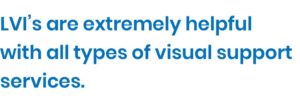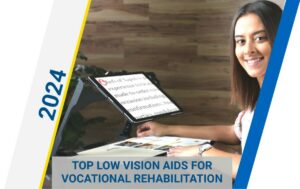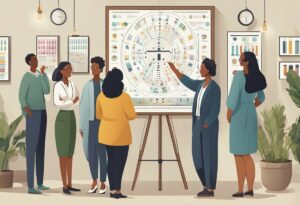Diagnosed with Macular Degeneration… Now What (7 of 12) – Teacher of the Visually Impaired


Go to this link to order your printed copy of our Low Vision Guide – https://nelowvision.com/product/macular-degeneration-now-what/
So, you have been diagnosed with Macular Degeneration, now what? Many, when being told they have Macular Degeneration, inaccurately hear, “I’m going blind”, and that can feel like your whole world is collapsing.
It is extremely rare to go completely blind from Macular Degeneration, whether you have either the wet or dry type. If someone tells you that nothing more can be done, that can be very depressing and is often not completely correct. What matters is a better understanding of how to navigate the landscape of the professionals who can assist you with adapting to a world of vision loss.
By the way…. congratulations, you have now become a carpenter! Yes, a carpenter…meaning you now need to assemble a new toolbox of 12-24 new ‘vision-loss’ tools to help you with seeing both near, intermediary and distance objects.
In this 12-part Macular Degeneration Low Vision Guide, I have outlined ideas for you or a loved one to consider when diagnosed Macular Degeneration. It is important to note that not all these action steps are required, but they should be given strong consideration.
#7: Teacher of the Visually Impaired (TVI’s) – Identify a TVI in your school or district
Are you a student with a visual impairment? Are you a parent of a student with a visual impairment? If so, then make it a priority to identify a TVI in your school or district.
TVI’s are teachers who work with visually impaired students. TVI’s are commonly referred to as “vision teachers.” The TVI’s responsibility is to help students who are visually impaired receive a comprehensive education while also teaching them strategies to live a full life, regardless of their disability. Sight is a crucial aspect of learning and without the ability to see, much of the world is unknown. 
This presents many unique challenges to educating students who are visually impaired, who have the same capacity to learn as any other student, but they require special teachers to assist them throughout the process.
Remember your own experience in school and try to envision having a significant visual impairment. It would be a struggle to read your teacher’s notes on the board at the front of the class. It would be a struggle to make out the graphs and diagrams included in your textbooks. It would be daunting trying to navigate a maze of school hallways filled with crowds of students.
These are just some of the demands that visually impaired students face in a traditional education setting. Vision teachers draw on a number of specialized resources and methods to accomplish all of the traditional goals of education.
It is the TVI’s job to evaluate the learning needs of students with visual impairments and tailor personalized education programs to support them. With proper support, students who are visually impaired can receive all the benefits of a comprehensive education, and TVI’s are critical in helping guide them along the way.
<Click here to read about step #6: Non-Profit Organization – Make it a priority>
<Click here to learn more about our resources for Educators.>
<Click here to order your printed copy of this 12-part Resource Book>
<Click here to download a PDF of the entire report.>
Scott V. Krug is the President of New England Low Vision and Blindness, a company located in New England, and specializes in bringing hope to people who are low vision or blind through technology, training, and care. Scott has been working in the field of technology and optics for people who are low vision or blind since 1992. Website: NELowVision.com.




